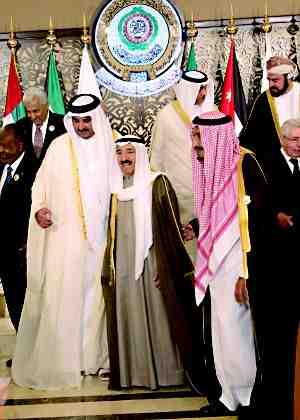Syrian issue takes center stage at Arab League summit in Kuwait
The Emir of Kuwait Sheikh Sabah Al-Ahmad Al-Jaber Al-Sabah, opened Tuesday, the 25th Arab League Summit.
The two-day summit will primarily discuss the Israeli-Palestinian conflict and the ongoing Syrian conflict which are on top of its agenda, while an ongoing spat between Gulf states over Egypt’s Muslim Brotherhood is likely to stay off the agenda, diplomatic sources said.
The head of the Syrian opposition coalition Ahmed Jarba is expected to address Arab leaders during the opening session, AFP reported.
Syria’s opposition will not be filling the country’s empty Arab League seat for a second time – it was given the seat at Doha’s 2013 summit – as it hasn’t met the legal requirements, Arab League head Nabil al-Arabi told AFP.
The 22-member League suspended the government of President Bashar Assad in 2011 after it unleashed a bloody crackdown on a pro-democracy movement that sparked a violent uprising.
Lakhdar Brahimi, the UN-Arab League mediator, is also expected to brief leaders on the peace process in Syria, following two failed rounds of international negotiations in Geneva.
During the news conference, Brahimi said Monday that for the time being, another round of peace talks between the Syrian government and opposition was “out of the question,” according to AFP.
“A return to Geneva is out of question for the time being because the criteria have not been met,” Brahimi said.
The Geneva II talks were called off by Brahimi in February, and no date for a further bout of talks has yet been decided upon.
Brahimi previously cut off the peace talks in Geneva earlier this year to “give government and opposition an opportunity to take stock.”
He has also accused the Syrian government
of delaying efforts to resume peace talks during a UN Security Council briefing in early March.
During Sunday’s preparatory meeting on Sunday, Arab ministers called for a ceasefire in Syria – urging the UN to pass a resolution under Chapter 7, that involves the use of force – in the face of a sprawling conflict that shows no sign of abating.
The Syrian crisis entered its fourth year earlier this month and has resulted in the deaths of at least 146,000 people and the displacement of millions of Syrians, the Syrian Observatory for Human Rights reported.
Meanwhile, an ongoing region-wide rift has apparently impacted on the number of states attending the Arab Summit, AFP reported, as Kuwait – who is hosting the meeting for the first time – said that 13 heads of state had confirmed their attendance. There is a low-turnout from Kuwait’s Gulf neighbors, according to AFP.
Tensions have been rising with Qatar due to Doha’s support of the ousted Muslim Brotherhood leadership in Egypt, which has subsequently affected its relationship with Saudi Arabia, Bahrain and the UAE as well. The latter three states withdrew their diplomats from Doha earlier this month in protest of Qatar’s Brotherhood ties.
In this context, thr Egyptian foreign minister told a press conference in Kuwait that it was not possible to forge a compromise with Qatar during the summit, AFP reported.
“I don’t expect we will leave from the Kuwait summit with all parties convinced that all things are resolved,” he told reporters in Kuwait on Sunday. “The wound is deep.”
A Kuwaiti foreign ministry official, Khaled al-Jarallah, also said the dispute between Qatar and its neighbors would “be resolved within the Gulf house,” not at the Arab summit, AFP reported.
On the Palestinian issue, Arab leaders are expected to call for $100 million in monthly aid for the Palestinian Authority and to reject recognition of Israel as a Jewish state.
Palestinian President Mahmoud Abbas arrived in Kuwait Monday evening to participate in the summit and to brief his Arab counterparts with the latest developments of the peace process and negotiations with Israel.
Sources:


